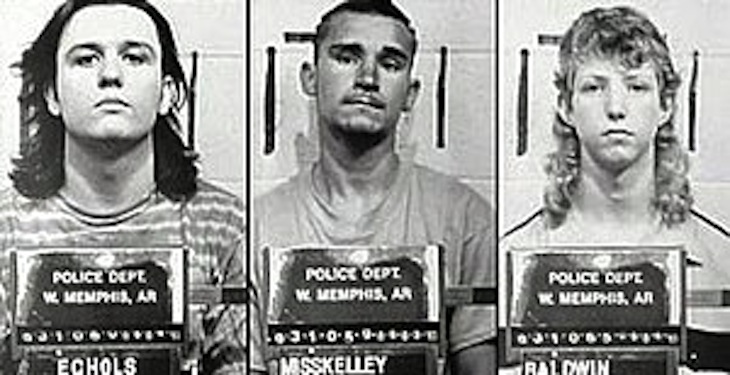Echols says he suffered brain injuries on Arkansas’ death row, his wife calls for end to executions
by August 19, 2017 11:36 am 10,784 views

Damien Echols, Jason Baldwin and Jessie Misskelley Jr., were convicted of the murders of three 8-year-old boys in West Memphis in 1993.
Six years ago Saturday (Aug. 19), Damien Echols woke for the last time on the wrong side of a set of jail bars. He spent 18 years in prison, convicted of the murders of three 8-year-old boys in West Memphis in 1993. He, along with Jason Baldwin and Jessie Misskelley Jr., denied any involvement and there were questions about the evidence against them.
Echols told Talk Business & Politics the scars from his incarceration are still real. Each day he copes with physical and psychological damage he suffered while in prison.
“I spent 18 years in prison under abject conditions,” he said. “Ten years was spent in solitary torture. The brain injury I sustained will always plague me.”
The specific injury was not disclosed. Echols wife, Lorri Davis Echols told Talk Business & Politics her husband suffers from post traumatic stress disorder (PTSD). He has had bouts of depression, and has spent years acclimating to life outside of prison.
“It’s been a roller coaster, but we’ve worked really hard to build a new life. It was and is like starting new,” she said.
The couple lives in the Harlem neighborhood of New York City and have traveled the world, giving lectures at universities and other venues about a broad range of subjects including false convictions, the death penalty, and Echols’ spiritual views. He wrote a New York best-selling autobiography, “Life after Death,” and he and his wife helped to produce the critically acclaimed Showtime documentary, West of Memphis. One place he visited early this spring terrified him – Arkansas.
In April eight men on Arkansas’ Death Row were slated for execution. Echols, had he not been released, would have been included. He journeyed to Little Rock with his friend, and avid supporter, actor Johnny Depp. The trip terrified him, and he suffered from a high level of anxiety while he was still in the Natural State.
“They tried to kill me,” he told TB&P at the time.

During the last five years there have been virtually no new leads discovered by Echols or the army of attorneys, private investigators, forensic scientists, and others who worked to secure his freedom.
THE WEST MEMPHIS KILLINGS
Echols, along with Baldwin, and Misskelley Jr., were convicted of the 1993 slayings of three West Memphis 8-year-olds, Stevie Branch, Christopher Byers, and Michael Moore. The boys were riding bikes in their West Memphis neighborhood when they vanished around sunset. Prosecutors claim the boys entered a patch of woods near their homes, dubbed “Robin Hood Hills,” by locals. The three boys were bludgeoned during an attack prosecutors claimed was inspired by Satanism or a belief in the occult.
One month later the three teens, all from Marion, were charged with the murders after Misskelley confessed to the crime and implicated the others. The confession contained inaccuracies including the time and place of the murders, the manner in which they were performed, and he told police two of the boys were sexually assaulted when autopsy results showed no sexual assault took place.
Despite the inaccuracies, and no physical of forensic evidence tying the teens to the crimes, two juries found them guilty. Echols was sentenced to death while the other two received life terms.
The three teens dubbed “The West Memphis Three” languished in obscurity until the 1996 documentary “Paradise Lost: The Child Murders at Robin Hood Hills” was released by HBO. Doubts surfaced whether the teens, dubbed “The West Memphis Three” committed the crimes.
The documentary saved Echols life, he said during a 2010 interview. The circumstantial case and the lack of evidence raised doubts among a burgeoning support group that included Depp, Pearl Jam front man Eddie Vedder, Dixie Chicks lead singer Natalie Maines, and the director Sr. Peter Jackson. Millions of dollars was raised in an attempt the free the men.
NEW EVIDENCE, FALSE STATEMENTS
By 2011 Arkansas officials were under pressure to release the men. A new trial was about to be ordered in the case. New DNA evidence had been discovered implicating Stevie Branch’s stepfather, Terry Hobbs. A hair found in the ligatures that bound Michael Moore was a virtual genetic match for him, and a hair found on a tree stump next to where the bodies were dumped was a genetic match for his alibi witness at the time of the murders, David Jacoby. Hobbs and Jacoby have denied involvement in the murders.
One witness who testified during Misskelley’s trial, Victoria Hutcheson, signed a sworn affidavit saying she lied at the trial. During an interview in 2009 she told a TB&P reporter she was under pressure from police to provide evidence and was facing a credit card fraud charge. Her son, Aaron, was friends with the victims, and he claimed for a time to have witnessed the murders, but his statements proved false. She told jurors she attended a “witches gathering” or esbat with Echols and Misskelley. Testimony from another witness who claimed to have heard Echols and Baldwin talking about the murders at a softball game would have likely been disproved during a new trial, prosecutors admitted.
Prosecutor Scott Ellington agreed to release them under the terms of an Alford Plea. This unique legal mechanism allowed them to profess innocence while at the same time acknowledging the state might have enough evidence to convict them. It’s essentially a no contest plea. Ellington has said numerous times if new trials had been ordered, the men would have been freed because of the changing witness statements, new scientific evidence, and “stale evidence.”
‘ARKANSAS MAKES MISTAKES’
Echols has had no contact with officials who worked to imprison him, he said. Lorri Echols said the state of Arkansas is not only culpable in her husband’s wrongful incarceration, but it has been negligent in not finding and prosecuting the person or persons who killed the three boys. A new investigation needs to be opened, and the killer or killers need to be brought to justice, she said. Occasionally, Echols will encounter a troll on social media networks who believes he’s guilty, but most people he interacts with believe in his innocence, she said.
“In our day to day life in New York, people tend to have done their homework,” she said.
The couple has several creative projects they are working on. Echols is writing a book that will be published by Sounds True in 2018. Lorri will participate in an art show later this year in Chicago.
Arkansas officials announced Friday they plan to restart executions. Lorri Echols advises against it.
“Once again, Damien’s case is proof that Arkansas makes mistakes. How many innocent men have they executed? Is there anything else that needs to be said?”
